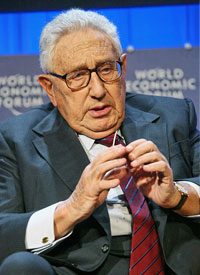
Rahm Emanuel, President-elect Barack Obama’s chief of staff, has declared that “you don’t ever want a crisis to go to waste.” As reported here yesterday, former Secretary of State Henry Kissinger has been busy lately promoting the idea that Obama should move quickly once in the White House to turn various economic and political crises into opportunities to create a “new world order.” (The words are Kissinger’s.)
Kissinger, never one to let a crisis go to waste, has been busy on an important new-world-order project in Russia with Vladimir Putin. Although it has gone virtually unreported in the U.S. media, Kissinger has been featured prominently in the Russian media during his many trips over the past decade to Moscow to meet with Putin and Yevgeny Primakov, the former KGB terror master for the Soviet Union in the Middle East. In 2007, Kissinger and Primakov were appointed by Putin to co-chair a bilateral “working group” of Russian and American political insiders to tackle issues such as global terrorism, nuclear proliferation, and nuclear threats.
Novosti, the Russian “news” agency run by Putin-friendly apparatchiks, reported on the new working group in an April 26, 2007 story, noting that “Kissinger, U.S. secretary of state from 1973 to 1977, has been a frequent guest in Russia since Putin took office in 2000.”
A Novosti story on July 13, 2007 reported on Kissinger’s “closed door” meeting with Putin, Primakov, and a delegation of former U.S. officials at Putin’s presidential residence. The Novosti article, along with multiple photos of the event, contrasted sharply with the absence of any coverage of the conference by the major U.S. media, which should have been on top of such a meeting of world leaders and should have let the American public know about it. Accompanying Kissinger were: former Secretary of State George Shultz; former Treasury Secretary Robert Rubin; former Special Representative for Arms Control, Nonproliferation and Disarmament Ambassador Thomas Graham, Jr.; former Senator Sam Nunn; and Chevron Chairman and Chief Executive Officer David O’Reilly. All of the Kissinger-led U.S. team, save for O’Reilly, are high-level members of the Council on Foreign Relations (CFR), lending credence to the belief that this is actually a project of the CFR, the premier organization pushing for a new world order for much of the past century.
Like Kissinger, the CFR and its publication Foreign Affairs also refer explicitly to a “new world order”; for a couple of examples, click here and here.
In December, Kissinger was back in Russia meeting with President Dmitry Medvedev, Putin’s protégé. Again, no coverage in the U.S. media, though the Russian press considered it newsworthy. Russia Today, a Novosti subsidiary, reported: “While waiting for the Russian president, Henry Kissinger had been chatting with Evgeny Primakov, Russia’s former foreign minister.” Primakov now heads the Russian Chamber of Commerce, a post that experienced intelligence analysts see as the perfect cover to continue his intelligence functions for the KGB-FSB during his numerous trips to abroad, especially to the Middle East, where he meets with leaders of many of the terror regimes he supported in the Soviet era.
Kissinger and his fellow globalists at the Council on Foreign Relations never seem to be discomfited working with the leaders of totalitarian regimes. Indeed, they seem to have the most cordial of relations with one another. They do not seem to be concerned that the Putin-Medvedev regime has been brutally suppressing all dissent and opposition — and killing those who refuse to yield to the suppression. Even “mainstream” media like the BBC have noted that under Putin, the KGB’s power and influence have increased to unprecedented heights.
In an article entitled, “KGB influence ‘soars under Putin’” the BBC reported:
Four out of five political leaders and state administrators in Russia either have been or still are members of the security services, a study suggests.
The unprecedented research implies a huge expansion of KGB-FSB influence in politics and business in recent years.
Many of the officials concerned have been appointed under President Vladimir Putin — himself a former spy chief….
Among the presidential administration, members of the government, deputies of both chambers of parliament, regional heads, as well as the boards of Russia’s top state corporations, four in five officials worked for the KGB, or continue to work for one or more of its successor organizations.
Readers of The New American are not surprised by this, as we have been reporting on the continuation of the Soviet communist program under the supposed “reform” government of Russia over the past two decades. However, to Kissinger and the new-world-order cheerleaders at the Council on Foreign Relations, Putin’s “democratic deficit” (or Hu Jintao’s in China) is a triviality that should not be allowed to stand in the way of East-West “convergence,” with the final goal being world government under an expanded and fully empowered United Nations.
The convergence strategy was, perhaps, most nakedly explained by Ford Foundation President H. Rowan Gaither (a Council on Foreign Relations member), who admitted to congressional investigator Norman Dodd in 1953 that he and others inside and outside of government were working “to so alter life in the United States that we can be comfortably merged with the Soviet Union.” (See William H. McIlhany, The Tax-Exempt Foundations (Arlington House, 1980), pp. 60-61.)
Putin, Primakov, and Medvedev, along with Kissinger and his U.S. confreres, appear to be working toward the same objective announced by Gaither more than 50 years ago.
See also “Rooting for World Government.”
Photo: World Economic Forum



